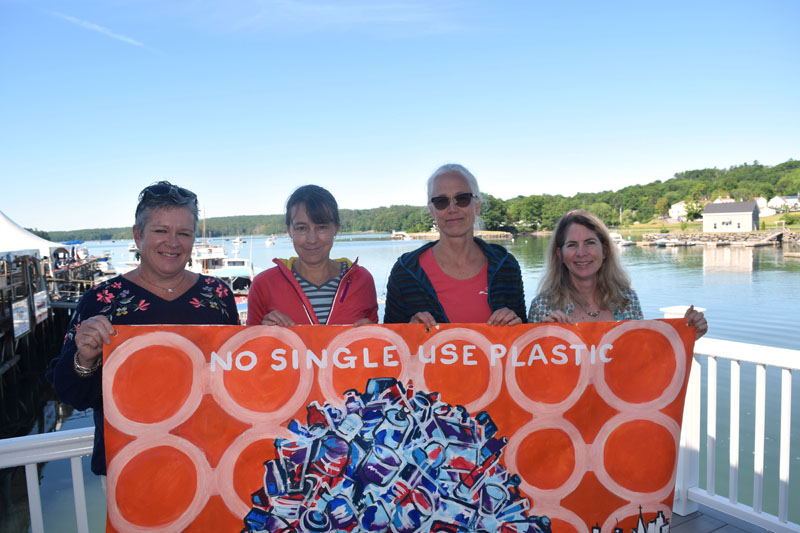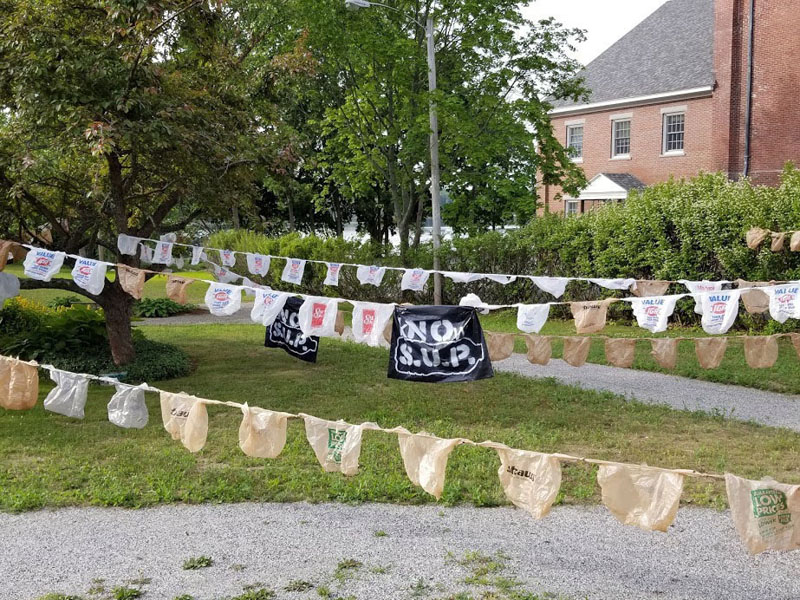
From left: kNOw S.U.P. members Ali Stevenson, Jenny Mayher, Adele Gale, and Co-chair Eleanor Kinney hold a painting on the deck outside the organization’s meeting place in downtown Damariscotta. The painting illustrates the group’s mission to reduce reliance on single-use plastics. (Jessica Clifford photo)
Local volunteers established the Damariscotta-based organization kNOw S.U.P. in January to raise awareness in the Twin Villages of the environmental risks posed by single-use plastics.
“This is a really hot issue across the country,” said kNOw S.U.P. Co-chair Eleanor Kinney, of Bremen. S.U.P. stands for single-use plastics.
“By 2050, it is estimated there will be more plastic in the ocean than fish,” a statement on the kNOw S.U.P. website says. “It is already in the fish and shellfish we eat. This is a direct threat to the Damariscotta region’s economy and way of life.”
The kNOw S.U.P. working group formed after a screening of the documentary “The Smog of the Sea” at Lincoln Theater in January.
Today, the nine-member group has four subcommittees, for arts and events, business engagement, communication, and education and schools. Together, they are working to build a network of less plastic-dependent people and institutions in the Twin Villages.
The entire group meets once every three to four weeks at River House, at 27 Main St. in Damariscotta, while the subcommittees each have ongoing work. Kinney and Julie Lamy co-chair the group.
Though kNOw S.U.P. has not incorporated as a nonprofit, it receives support from the Natural Resources Council of Maine and fiscal sponsorship from Upstream, a Damariscotta-based nonprofit that works to reduce the use of plastic on a national level. Lamy is the engagement director for Upstream.
The group has a network of other collaborators, including residents, businesses, and schools.
The main goal for kNOw S.U.P. is to educate the community about its plastic consumption and to find creative alternatives that are either compostable or plastic-free.
The name kNOw S.U.P. originates from this educational mission.
“The know is about awareness, and the NO is about taking action to reduce or eliminate single-use plastics from our lives. Once you know, you want to say NO!” Kinney wrote in an email.
“It’s not about right and wrong,” member Jenny Mayher said. “It’s about ‘Wow, we created this huge problem and we’re just figuring it out and what are we going to do about it?’”
The group focuses on reduction of use because, Mayher said, “plastic recycling is a myth.”
According to the peer-reviewed journal Science Advances, since 1950, 8.3 billion metric tons of plastic have been created. Just 9 percent of the plastic has been recycled, while 79 percent is sitting in landfills or polluting the environment and 12 percent has been destroyed through incineration.

An art installation by kNOw S.U.P. at Veterans Memorial Park in Newcastle demonstrates the number of plastic bags the average person uses in a year, which the organization estimates at 300-500. (Photo courtesy Nick Azzaretti)
The group is focusing on the Twin Villages because the towns are the service center for the county. However, Kinney said kNOw S.U.P. wants to make the area a model community for other towns that strive for reduction in plastic consumption.
“Because we’re a network of small towns and communities, with volunteer governments, there is a lot of opportunity for engagement and reaching a large part of (our) population,” Kinney said.
According to the Natural Resources Council of Maine, 15 towns in Maine already have bans or restrictions on single-use plastic bags. Damariscotta is considering a proposal to ban single-use plastic bags and Styrofoam food containers.
Along with showing support for this proposal, kNOw S.U.P. is taking on its own initiatives.
In partnership with Upstream, it sponsored a screening of the documentary “A Plastic Ocean” in early June. The film follows journalist Craig Leeson, who teams up with a diver and scientists to discover the amount of plastic pollution in the world’s oceans over a four-year exploration.
On the morning of June 27, the group, with the town’s OK, created a pop-up art installation at Veterans Memorial Park in Newcastle. Members of the group tied a few ropes from one tree to another and hung plastic bags from the lines like laundry. The installation represented the average number of plastic bags a person goes through within a year, which is about 300-500, Kinney said.
The group has been brainstorming other plans to stay in the community spotlight.
Some of their ideas include working with schools to organize a plastic-free week from Sept. 24-30 to raise awareness among students, and hosting more documentary screenings at the Lincoln Theater, with panel discussions afterward. In addition, kNOw S.U.P. hopes to have a presence at the Pemaquid Oyster Festival and the Damariscotta Pumpkinfest, and to work with organizers to reduce the amount of plastic used at the events.
A page on the group’s website, knowsup.org, recognizes companies and organizations in the Twin Villages that follow less plastic-dependent business strategies. Some of the businesses include Wicked Scoops, a plastic-free ice cream shop in downtown Damariscotta; Morning Dew Farm, which collects plastic seedling pots for later reuse; and Rising Tide Community Market, which performs plastic audits to see how much it is using.
“We just want to acknowledge and celebrate the businesses that are taking steps,” Kinney said.
To get other businesses and consumers in the community thinking about their plastic consumption, Kinney said the group wants to place an educational display outside River House with information about all the threats caused by single-use plastics and what they could use instead of plastic.
Adele Gale, another member of the group, said kNOw S.U.P. hopes to create a list of standards for businesses to follow if they want to be part of the effort.
To sign up for updates about kNOw S.U.P.’s work, send an email to knowsingleuseplastic@gmail.com.



